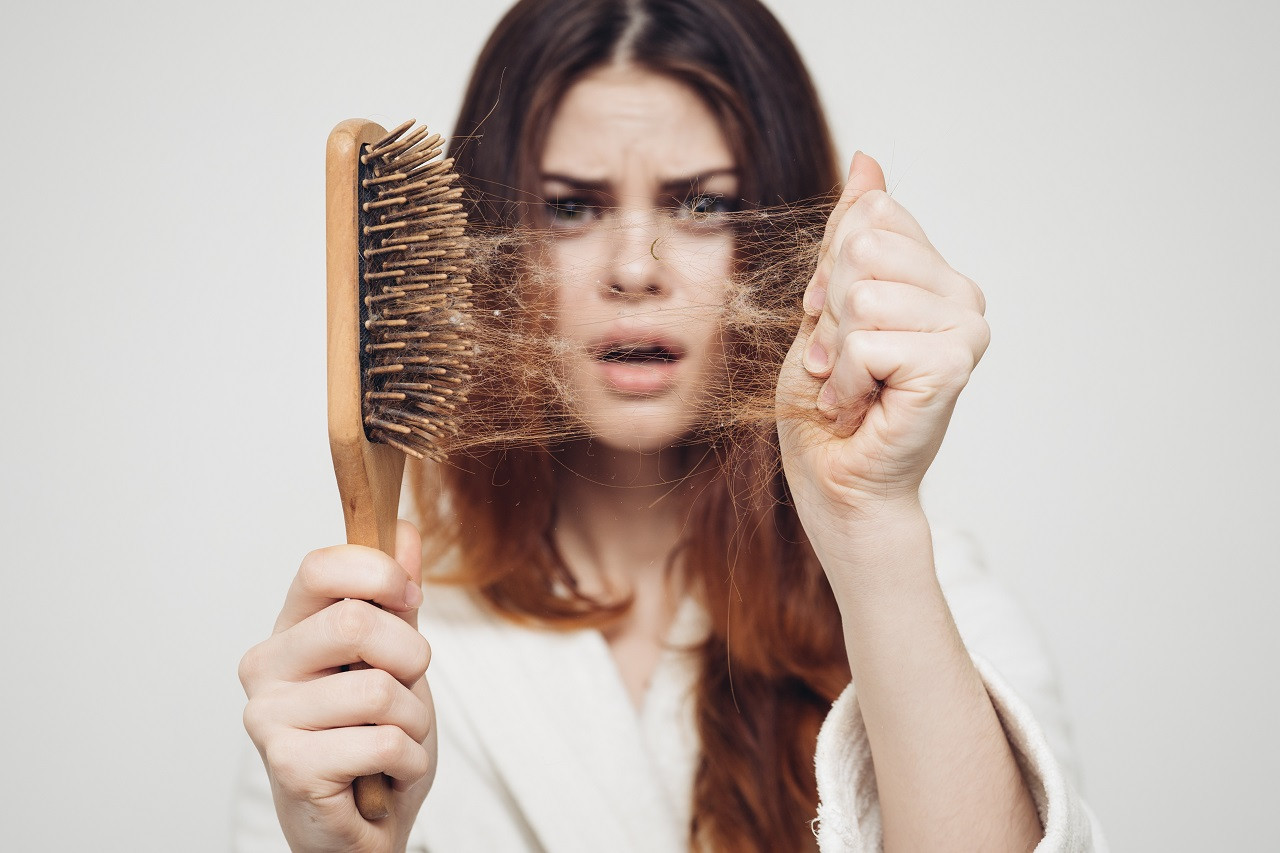Hair Loss: Who Gets It And What Causes It?
What factors contribute to hair loss?
There are several causes of hair loss. What's causing your hair loss can influence whether or not your hair:
- Falls out gradually or unexpectedly
- Thins
- Can regrow on its own
- Treatment is required to regenerate
- Immediate attention is required to avoid irreversible hair loss.
Hair loss causes:
Hair loss that is inherited
This form of hair loss affects both men and women and is the most frequent cause of hair loss globally. Male pattern hair loss is a term used to describe hair loss in males. Female pattern hair loss affects women. Androgenic alopecia is the medical name for hair loss that occurs in either males or women.
Whatever title you pick, it implies you've inherited genes that cause your hair follicles (the structures from which each hair develops) to shrink and finally cease developing hair. Shrinking can occur as early as your adolescence, although it is more common later in life.
The earliest visible indication of genetic hair loss in women is generally overall thinning or a widening portion.
A receding hairline or bald patch at the top of a man's head is generally the first indicator of genetic hair loss.
Is it possible to re-grow?
Yes, therapy can help to prevent or slow down hair loss. It may also aid with hair growth. The sooner therapy begins, the better it works. You will continue to lose hair if you do not get therapy.
Hair loss that is inherited
This form of hair loss affects both men and women and is the most frequent cause of hair loss globally. Male pattern hair loss is a term used to describe hair loss in males. Female pattern hair loss affects women.
Age
Most people experience some hair loss as they become older because hair growth slows. Hair follicles eventually cease producing hair, causing the hair on our scalp to diminish. Hair begins to lose its color as well. The hairline of a lady gradually recedes.
Is it possible to re-grow?
When detected early, therapy can help some people regrow their hair.
Age
Most people experience some hair loss as they become older because hair growth slows.
Alopecia areata
Alopecia areata is a disorder that occurs when the body's immune system destroys hair follicles (the structures that maintain hair in place), resulting in hair loss. Hair loss can occur anywhere on the body, including the scalp, within the nose, and in the ears. Some may have lash or brow loss.
Is it possible to re-grow?
Yes. If your hair does not regenerate on its own, therapy may be used to encourage regrowth.
Alopecia areata
Alopecia areata is a disorder that occurs when the body's immune system destroys hair follicles (the structures that maintain hair in place), resulting in hair loss.
Cancer treatment
If you undergo chemotherapy or radiation therapy to your head or neck, you may lose all (or most) of your hair within a few weeks of beginning treatment.
Is it possible to re-grow?
Hair normally begins to regenerate within months of completing head or neck chemotherapy or radiation treatments. Dermatologists can prescribe medications to help hair regrow more quickly.
Is it avoidable?
Wearing a cooling hat before, during, and after each chemotherapy treatment may aid in the prevention of hair loss.
Cancer therapy
If you undergo chemotherapy or radiation therapy to your head or neck, you may lose all (or most) of your hair within a few weeks of beginning treatment.
Childbirth, sickness, or other sources of stress
You may notice a lot more hairs in your brush or on your pillow a few months after giving birth, recuperating from an illness, or having surgery. This can also occur following a traumatic event in your life, such as a divorce or the loss of a loved one.
Is it possible to re-grow?
When the tension is relieved, your body will readjust and the excessive shedding will cease. When the shedding stops, most people's hair returns to normal fullness in 6 to 9 months.
Care for your hair
If you color, perm, or relax your hair, you may be causing damage to it. This damage might cause hair loss over time.
Is it possible to re-grow?
You can alter your hair-care routine to avoid hair loss. When a hair follicle is damaged, hair cannot develop from that follicle. Permanent bald patches are caused by a high number of damaged hair follicles.
Your hairstyle is pulling on your scalp.
If you often wear your hair pulled back, the constant pulling might result in irreversible hair loss. Traction alopecia is the medical term for this illness.
Is it possible to re-grow?
No. By making a few modifications, you may avoid hair loss. For example, FUE hair transplant method can help you here.
Infection of the scalp
Scaly and often inflammatory spots on your scalp might result from a scalp infection. You may see what appear to be little black spots on your scalp. These are actually hair stubs. Some people get bald spots.
Is it possible to re-grow?
Yes, therapy is effective in eradicating the virus. Hair tends to grow back once an infection has cleared.
Medication
Hair loss is a potential adverse effect of various drugs. If you suspect a medicine is causing your hair loss, check with the doctor who provided it to see if hair loss is a probable side effect. It is critical that you do not discontinue the medicine before consulting with your doctor. Stopping certain drugs abruptly might result in major health concerns.
Is it possible to re-grow?
Yes.
Psoriasis of the scalp
Many individuals with plaque psoriasis eventually develop psoriasis on their scalp. This can result in hair loss.
Is it possible to re-grow?
When the scalp psoriasis clears, hair tends to recover, although this takes time. You may be able to avoid hair loss by following the advice of dermatologists.
Pulling your hair
Some people tug on their hair as a kind of stress relief. They may be completely unconscious that they are yanking their hair. Trichotillomania is the medical word for this.
Is it possible to re-grow?
Yes, if you haven't harmed the hair follicles. You must quit tugging your hair in order for it to regenerate.
Scarring alopecia
When inflammation damages hair follicles, this disease occurs. A hair follicle that has been damaged can no longer produce hair. This can be caused by a variety of factors. This set of diseases is known as cicatricial alopecia.
Is it possible to re-grow?
A hair follicle that has been destroyed cannot regrow a hair. Early detection of this illness can help to avoid additional hair loss.
Infection transmitted through sexual contact
A sexually transmitted infection (STI) can cause hair loss if left untreated. Syphilis is a sexually transmitted infection. Syphilis, if left untreated, can cause patchy hair loss on the scalp, brows, beard, and other areas. Hair loss can also be caused by other STIs.
Is it possible to re-grow?
Hair frequently begins to regenerate after the STI has been treated.
Thyroid disorder
You may notice thinning hair if you have a thyroid condition. When some people brush their hair, they find that it comes out in clumps.
Is it possible to re-grow?
Yes, treating thyroid condition can help you regain your hair.
Inadequate levels of biotin, iron, protein, or zinc
If you don't receive enough of one or more of these, you may experience significant hair loss.
Is it possible to re-grow?
Yes. Hair can regenerate if your body obtains enough of the nutrients it needs.
Friction
Hair loss can occur in areas where boots, stockings, or tight garments constantly scrape against the skin. Frictional alopecia is the medical word for this.
Is it possible to re-grow?
When the rubbing ceases, the hair usually regrows on its own.
Poison
Hair loss can occur as a result of being steadily poisoned. Arsenic, thallium, mercury, and lithium are among poisons that can cause hair loss. Hair loss can occur if you consume a substantial amount of warfarin, which is present in rat poisons. Excessive vitamin A or selenium consumption is also harmful and can result in hair loss.
Is it possible to re-grow?
Yes, after you are no longer exposed to the toxin, your hair will regenerate.
Conclusion
While many reasons of hair loss may be effectively addressed, the key to effective therapy is determining what is causing the hair loss. Treatment is frequently ineffectual in the absence of a precise diagnosis. You may learn how we detect and treat hair loss by visiting: Diagnosis and treatment of hair loss







